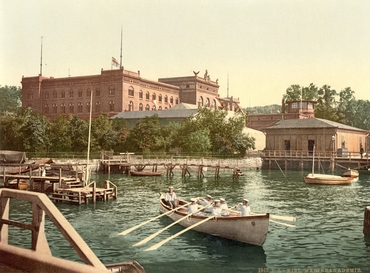Welcome to Part Nine of my latest Tale for Our Time, the lone but influential novel by British patriot turned Irish republican Erskine Childers - The Riddle of the Sands. In tonight's episode Davies suggests to Carruthers that the man behind the German plot is, in fact, not German at all - and proposes that they need to figure out what he's up to. Carruthers is resistant:
'If that's so, mightn't we come to be genuine spies ourselves?'
'And, after all, hang it!' exclaimed Davies, 'if it comes to that, why shouldn't we? I look at it like this. The man's an Englishman, and if he's in with Germany he's a traitor to us, and we as Englishmen have a right to expose him. If we can't do it without spying we've a right to spy, at our own risk——'
'There's a stronger argument than that. He tried to take your life.'
'I don't care a rap about that. I'm not such an ass as to thirst for revenge and all that, like some chap in a shilling shocker. But it makes me wild to think of that fellow masquerading as a German, and up to who knows what mischief—mischief enough to make him want to get rid of any one. I'm keen about the sea, and I think they're apt to be a bit slack at home,' he continued inconsequently. 'Those Admiralty chaps want waking up.'
Members of The Mark Steyn Club can listen to Part Nine of our adventure simply by clicking here and logging-in. Earlier episodes can be found here.
Davies' plan is to cut through Schlewswig Holstein from Kiel back to the North Sea and through Heligoland Bay to the home of his nemesis on the Frisian island of Norderney, in the lower left-hand corner of our map:

Meanwhile, back at the theme tune, John Downes, a Steyn Club member from the English Midlands, has finally met his match:
It's generally at about this time in one of Mark's series that some boob writes in and asks what the music is. I never have, because I've always recognised it, and was happy to feel a sense of superiority over those not as knowledgeable as I. Not this time though. I confess to bafflement. It might be Delius, though it sounds a lot too good for him (I'm not a fan). I'm guessing it's English of about the right period and that's a repertoire I love. Holst perhaps?
Mark... time to fess up! Put me out of my misery!
Well, it doesn't sound like Holst to me, John. But you got it first time, albeit while sorely underestimating the composer: it definitely isn't "a lot too good" to be Delius, because it's him alright - Sea Drift, which he was working at almost exactly the time Childers was writing this novel. I'm surprised a fellow who effortlessly recognized music by André Grétry and Jenő Huszka would have trouble with anything so obvious as Delius, John - it's signed all over, as the art dealers say. More Delius, in a very different context, here. And more music from Tales for Our Time - by Brahms, Glinka, Mahler, Mussorgsky and more here.
If you've yet to hear any of our Tales for Our Time, you can do so by joining The Mark Steyn Club. Membership is available now - and, if you sign up, you'll be all set for Part Ten of The Riddle of the Sands this time tomorrow (and all the earlier episodes, of course). And, if you've a friend who likes classic fiction, don't forget our special Gift Membership. Oh, and aside from audio fiction, we also do video poetry.

